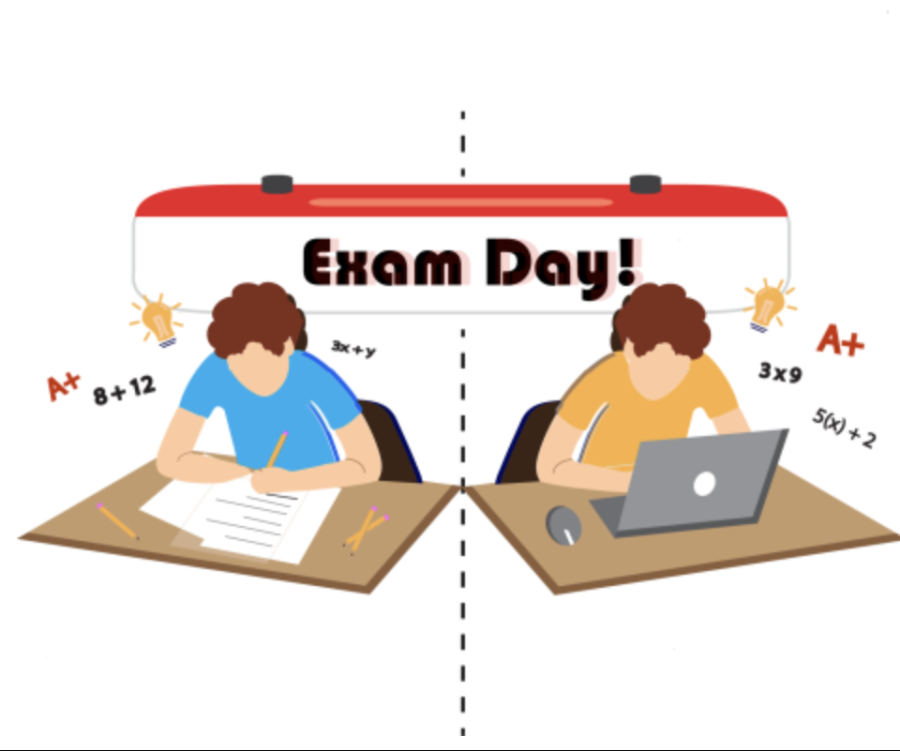Recently, the College Board announced that the SAT, one of the nation’s most commonly used college-entrance exams, will become completely digital in 2024. This significant change will likely result in a similar shift in assessments at the highschool level.
Because more colleges are going test-optional, the SAT and other standardized tests will soon switch entirely online because of the easier production, distribution, and grading process.
However, many students are worried about how the transition from paper to digital exams will affect their overall grades and test-taking skills, especially with mid-semester exams at Trinity right around the corner.
“Now that there is an increase in online testing throughout most schools, I definitely have to start thinking about how this change will affect me,” senior Victor Wang said.
Preparing for an assessment that determines a major portion of a student’s grade is already stressful, however the testing medium can add a complicating factor.
Although computer-based tests can make the grading process more efficient, they can also significantly influence a students’ test performance. According to the Partnership for Assessment of Readiness for College and Careers (PARCC), students obtained higher scores on English/language arts paper and pencil tests compared to computer tests.
“I always feel more comfortable taking a paper test,” Wang said. “It’s kind of a mental thing, but it’s also just being able to annotate the papers and not having to deal with tech issues.”
Eighth Grader Ashwin Anand said that some students are visibly stressed when it’s announced that the test will be online instead of on paper.
“Some people might have become accustomed to on-paper assignments and assessments,” Anand said. “Now as we get older, we switch to more online assessments, and that may make [the students] more anxious because it’s a new medium.”
A study at the American Institutes for Research examined whether the drop in test scores could be explained by differences in test formatting. They found that students who took the PARCC national academic test online scored significantly worse than their peers who took the same exam on paper, performing as if they had lost months of prep time or knowledge on the subjects.
While online tests allow teachers to ditch the process of hand grading, some teachers still acknowledge that not all students are comfortable with online assessments. English teacher Hannah Schuttler takes this into consideration.
“I always like to give students the opportunity to pick between an online test or an on-paper assessment,” Schuttler said. “Some other teachers I talk to are affected by the grading processes, but they don’t vary too much for me. And I think some students feel more comfortable taking quizzes or tests if they can pick which type to take.”
Schuttler explains the steps that her and her colleagues took to adjust to online learning, using tools that reflect the ability to annotate, circle and highlight answers, and return to questions you may have previously answered.
“During COVID-19, we switched everything over to the computer and were able to find a lot of nice resources and extensions that made it possible to annotate online, but I didn’t feel like we were getting the same kind of experience,” Schuttler said. “That physical aspect of your education is absolutely necessary.”
The Director of Curriculum Dr. Stephanie Dryden agrees that the online experience can’t compare to the original paper and pencil concept that nearly every student is used to.
“Although there are attempts to make replicas of these capabilities, it’s simply not the same,” Dryden said. “It’s a different level of engagement with material.”
Dryden said that most students’ performance will vary by their educational background, and the resources available to them can alter their test taking abilities. In other words, students familiar with using technology in the classroom may have an easier time taking an online assessment or exam.
“When it comes down to it, [students] are just more practiced taking assignments and assessments on paper than anything else,” Dryden said. “The majority of students don’t have access to those other capabilities at such a young age.”
The renovation of the SAT is influencing many schools to experiment with online testing, however that doesn’t necessarily mean the students are ready for it.
“Being able to annotate the paper, not worrying about formatting or tech issues, the ability to show all your work… All these things added up are just what makes me more successful when taking paper tests,” Wang said. “You don’t get any of this online.”




